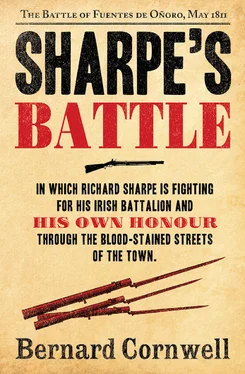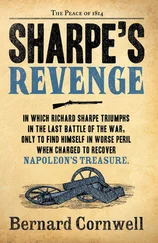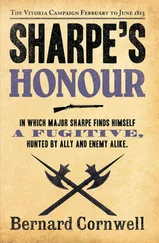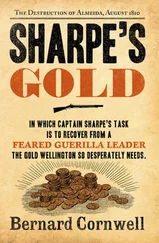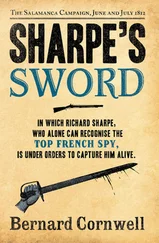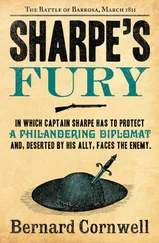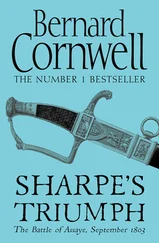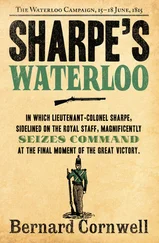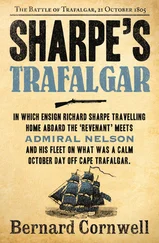1 ...7 8 9 11 12 13 ...21 Sharpe looked at the girl. She was no older than Perkins, maybe sixteen, and had dank, dirty, long black hair, but clean her up, he thought, and she would be a pretty enough thing, and immediately Sharpe felt guilty for the thought. The girl was in pain. She had watched her family slaughtered, then had been used by God knows how many men. Now, with her rag-like clothes held tight about her thin body, she was staring intently at the two dead soldiers. She spat at them, then buried her head in Perkins’s shoulder. ‘She’ll have to come with us, Perkins,’ Sharpe said. ‘If she stays here she’ll be slaughtered by those bastards.’
‘Yes, sir.’
‘So look after her, lad. Do you know her name?’
‘Miranda, sir.’
‘Look after Miranda then,’ Sharpe said, then he crossed to where Harper was organizing the men who would demolish the houses on top of the dead bodies. The smell of blood was as thick as the mass of flies buzzing inside the charnel houses. ‘The bastards will chase us,’ Sharpe said, nodding towards the lurking French.
‘They will too, sir,’ the Sergeant agreed.
‘So we’ll keep to the hill tops,’ Sharpe said. Cavalry could not get to the tops of steep hills, at least not in good order, and certainly not before their leaders had been picked off by Sharpe’s best marksmen.
Harper glanced at the two dead Frenchmen. ‘Were you supposed to do that, sir?’
‘You mean, am I allowed to execute prisoners of war under the King’s Regulations? No, of course I’m not. So don’t tell anyone.’
‘Not a word, sir. Never saw a thing, sir, and I’ll make sure the lads say the same.’
‘And one day,’ Sharpe said as he stared at the distant figure of Brigadier General Loup, ‘I’ll put him against a wall and shoot him.’
‘Amen,’ Harper said, ‘amen.’ He turned and looked at the French horse that was still picketed in the settlement. ‘What do we do with the beast?’
‘We can’t take it with us,’ Sharpe said. The hills were too steep, and he planned to keep to the rocky heights where dragoon horses could not follow. ‘But I’ll be damned before I give a serviceable cavalry horse back to the enemy.’ He cocked his rifle. ‘I hate to do it.’
‘You want me to do it, sir?’
‘No,’ Sharpe said, though he meant yes for he really did not want to shoot the horse. He did it anyway. The shot echoed back from the hills, fading and crackling while the horse thrashed in its bloody death throes.
The riflemen covered the Spanish dead with stones and thatch, but left the two French soldiers for their own comrades to bury. Then they climbed high into the misty heights to work their way westwards. By nightfall, when they came down into the valley of the River Turones, there was no sign of any pursuit. There was no stink of saddle-sore horses, no glint of grey light from grey steel, indeed there had been no sign nor smell of any pursuit all afternoon except just once, just as the light faded and as the first small candle flames flickered yellow in the cottages beside the river, when suddenly a wolf had howled its melancholy cry in the darkening hills.
Its howl was long and desolate, and the echo lingered.
And Sharpe shivered.
The view from the castle in Ciudad Rodrigo looked across the River Agueda towards the hills where the British forces gathered, yet this night was so dark and wet that nothing was visible except the flicker of two torches burning deep inside an arched tunnel that burrowed through the city’s enormous ramparts. The rain flickered silver-red past the flame light to make the cobbles slick. Every few moments a sentry would appear at the entrance of the tunnel and the fiery light would glint off the shining spike of his fixed bayonet, but otherwise there was no sign of life. The tricolour of France flew above the gate, but there was no light to show it flapping dispiritedly in the rain which was being gusted around the castle walls and sometimes even being driven into the deep embrasured window where a man leaned to watch the arch. The flickering torchlight was reflected in the thick pebbled lenses of his wire-bound spectacles.
‘Maybe he’s not coming,’ the woman said from the fireplace.
‘If Loup says he will be here,’ the man answered without turning round, ‘then he will be here.’ The man had a remarkably deep voice that belied his appearance for he was slim, almost fragile-looking, with a thin scholarly face, myopic eyes and cheeks pocked with the scars of childhood smallpox. He wore a plain dark-blue uniform with no badges of rank, but Pierre Ducos needed no gaudy chains or stars, no tassels or epaulettes or aiguillettes to signify his authority. Major Ducos was Napoleon’s man in Spain and everyone who mattered, from King Joseph downwards, knew it.
‘Loup,’ the woman said. ‘It means “wolf”, yes?’
This time Ducos did turn round. ‘Your countrymen call him El Lobo,’ he said, ‘and he frightens them.’
‘Superstitious people frighten easily,’ the woman said scornfully. She was tall and thin, and had a face that was memorable rather than beautiful. A hard, clever and singular face, once seen never forgotten, with a full mouth, deep-set eyes and a scornful expression. She was maybe thirty years old, but it was hard to tell for her skin had been so darkened by the sun that it looked like a peasant woman’s. Other well-born women took care to keep their skins as pale as chalk and soft as curds, but this woman did not care for fashionable looks nor for fashionable clothes. Her passion was hunting and when she followed her hounds she rode astride like a man and so she dressed like a man: in breeches, boots and spurs. This night she was uniformed as a French hussar with skin-tight sky-blue breeches that had an intricate pattern of Hungarian lace down the front of the thighs, a plum-coloured dolman with blue cuffs and plaited white-silk cordings and a scarlet pelisse edged with black fur. It was rumoured that Doña Juanita de Elia possessed a uniform from the regiment of every man she had ever slept with and that her wardrobe needed to be as large as most people’s parlours. To Major Ducos’s eyes the Doña Juanita de Elia was nothing but a flamboyant whore and a soldier’s plaything, and in Ducos’s murky world flamboyance was a lethal liability, but in Juanita’s own eyes she was an adventuress and an afrancesada , and any Spaniard willing to side with France in this war was useful to Pierre Ducos. And, he grudgingly allowed, this war-loving adventuress was willing to run great risks for France and so Ducos was willing to treat her with a respect he would not usually accord to women. ‘Tell me about El Lobo,’ the Doña Juanita demanded.
‘He’s a brigadier of dragoons,’ Ducos said, ‘who began his army career as a groom in the royal army. He’s brave, he’s demanding, he’s successful and, above all, he is ruthless.’ On the whole Ducos had little time for soldiers whom he considered to be romantic fools much given to posturing and gestures, but he approved of Loup. Loup was single-minded, fierce and utterly without illusions, qualities that Ducos himself possessed, and Ducos liked to think that, had he ever been a proper soldier, he would have been like Loup. It was true that Loup, like Juanita de Elia, affected a certain flamboyance, but Ducos forgave the Brigadier his wolf-fur pretensions because, quite simply, he was the best soldier Ducos had discovered in Spain and the Major was determined that Loup should be properly rewarded. ‘Loup will one day be a marshal of France,’ Ducos said, ‘and the sooner the better.’
‘But not if Marshal Masséna can help it?’ Juanita asked.
Ducos grunted. He collected gossip more assiduously than any man, but he disliked confirming it, yet Marshal Masséna’s dislike of Loup was so well known in the army that Ducos had no need to dissemble about it. ‘Soldiers are like stags, madame,’ Ducos said. ‘They fight to prove they are the best in their tribe and they dislike their fiercest rivals far more than the beasts that offer them no competition. So I would suggest to you, madame, that the Marshal’s dislike of Brigadier Loup is confirmation of Loup’s genuine abilities.’ It was also, Ducos thought, a typical piece of wasteful posturing. No wonder the war in Spain was taking so long and proving so troublesome when a marshal of France wasted petulance on the best brigadier in the army.
Читать дальше
